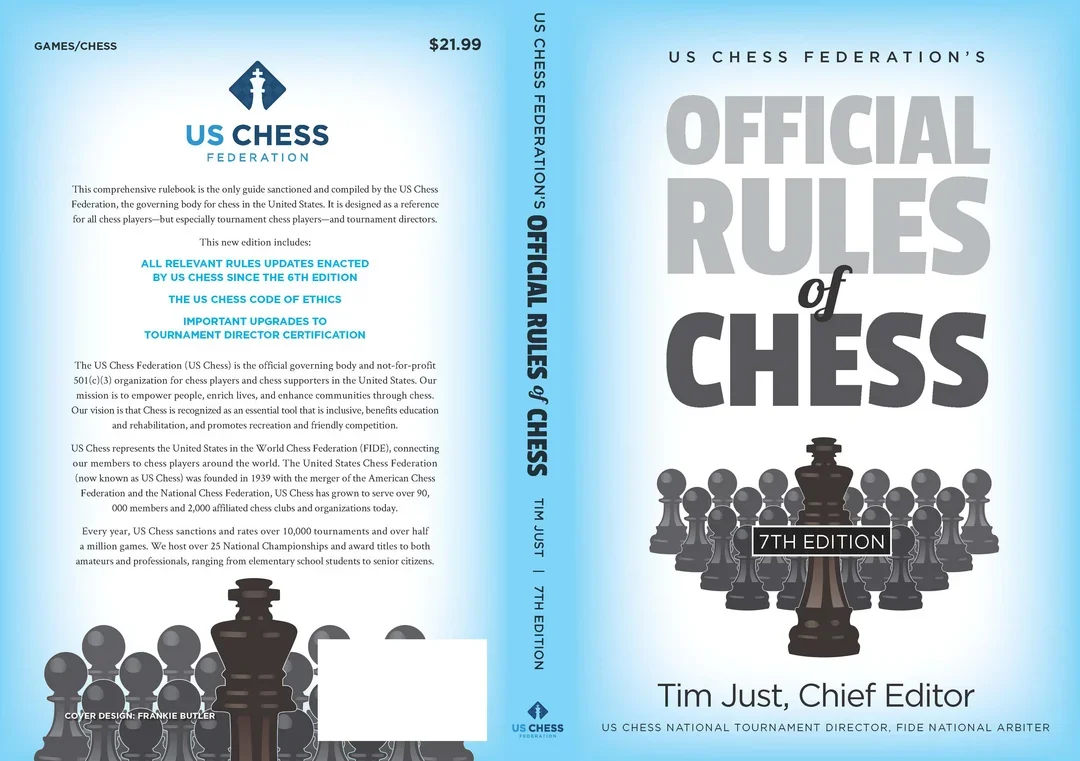Simple rulebook concepts get bogged down in confusing language—language that is difficult to comprehend and remember. Here are ten rulebook hacks that are easy to use and easy to remember. Will they have exceptions? Yep, but on a practical level those exceptions will rarely ever be seen.
- No Notation: You have five minutes left in your Regular (or dual) rated game before your time runs out. Do you need to still notate? No. Your opponent has five minutes of playing time left in that same contest. Do you still need to scribble down your moves? No. Neither player is required to notate if either player has five minutes—or less—of playing time on their clock for this time control. There is an exception to this hack—Increment. Some Increment time control games follow this rule, some do not. Without having to learn and remember the exceptions just keep right on notating throughout your game if there is an Increment time control of any length. Yes, even in the last five minutes of the time control. And don’t forget that Blitz and “Quick rated only” contests don’t require any notation at all; however I would suggest notating your Quick rated games using the same “last five minutes” hack that you just learned. That-a-way the hack is easier to use and remember. Besides, (1) you will then have a copy of your moves to analyze later and (2) you have a score sheet to help you make a claim or two.
- Freezing Time: You may stop the chess clock to get a TD to come to your board and make a ruling. Let your opponent know why you stopped the clock. If all you have is a general question, not a claim, then the clock should keep right on ticking. Freezing the time prevents a lot of complications—like having a flag fall during the resolution of the claim.
- No Pieces, No Time, No Victory: If your flag falls and your opponent does not have mating material (even a pawn is mating material!), the game is a draw. Player’s must have mating material to claim a win.
- Draw Offer: Make a move BEFORE offering a draw. Players have a right to see a move before deciding to accept that half-point or not. Besides, there is also the outside chance that the move you executed before offering a draw is the start of a mating combination. It is too late to take back a draw offer once it is made. And remember the draw offer can be decline either verbally or by touching a piece without adjusting it.
- Perpetual Check?: You can claim a draw if any position repeats three times—EVEN IF THAT POSITION DID NOT OCCUR THREE TIMES IN A ROW. While a triple repetition of a position typically occurs three times in a row, there is no perpetual check rule, just a three position repetition rule. And those same positions don’t have to be three in a row!?
- The Best Clock: The clock that trumps all others in your game is the one that supports the advertised tournament time control. Delay clocks are #1 for games with time delay. Increment clocks are the top choice for increment games. The classic analog clock (or a clock set that way) is always at the bottom of acceptable timers in delay or increment contests.
- Draw Claims = Draw Offers: Making a draw claim is the same as making a draw offer. If your opponent makes a draw claim you can instantly accept their draw offer—even before the TD makes a ruling. Or if you decide to wait and the TD rules against them, they still need to show you their move before you decide to accept or reject their draw offer.
- TD Invitation: In US Chess rarely will a TD intervene in your game without an invitation to do so by you or your opponent. If you need help, ask.
- Instant Endings: Stalemate and checkmate—well, legal stalemate and legal checkmate—instantly ends the game. Anything that happens after that, especially a “flag fall,” is meaningless; however, to prevent a lot of misunderstandings your best bet is to also stop the game timer.
- Flag Fall Tops Claims: If your opponent’s flag falls before any claim is settled—like your offer of a draw—you may claim a win on time (even if the draw offer was made first).
Categories
Archives
- January 2026 (13)
- December 2025 (27)
- November 2025 (29)
- October 2025 (39)
- September 2025 (27)
- August 2025 (29)
- July 2025 (43)
- June 2025 (25)
- May 2025 (24)
- April 2025 (29)
- March 2025 (29)
- February 2025 (20)
- January 2025 (24)
- December 2024 (34)
- November 2024 (18)
- October 2024 (35)
- September 2024 (23)
- August 2024 (27)
- July 2024 (44)
- June 2024 (27)
- May 2024 (31)
- April 2024 (51)
- March 2024 (34)
- February 2024 (25)
- January 2024 (26)
- December 2023 (29)
- November 2023 (26)
- October 2023 (37)
- September 2023 (27)
- August 2023 (37)
- July 2023 (47)
- June 2023 (33)
- May 2023 (37)
- April 2023 (45)
- March 2023 (37)
- February 2023 (28)
- January 2023 (31)
- December 2022 (23)
- November 2022 (32)
- October 2022 (31)
- September 2022 (19)
- August 2022 (39)
- July 2022 (32)
- June 2022 (35)
- May 2022 (21)
- April 2022 (31)
- March 2022 (33)
- February 2022 (21)
- January 2022 (27)
- December 2021 (36)
- November 2021 (34)
- October 2021 (25)
- September 2021 (25)
- August 2021 (41)
- July 2021 (36)
- June 2021 (29)
- May 2021 (29)
- April 2021 (31)
- March 2021 (33)
- February 2021 (28)
- January 2021 (29)
- December 2020 (38)
- November 2020 (40)
- October 2020 (41)
- September 2020 (35)
- August 2020 (38)
- July 2020 (36)
- June 2020 (46)
- May 2020 (42)
- April 2020 (37)
- March 2020 (60)
- February 2020 (38)
- January 2020 (45)
- December 2019 (34)
- November 2019 (35)
- October 2019 (42)
- September 2019 (45)
- August 2019 (56)
- July 2019 (44)
- June 2019 (35)
- May 2019 (40)
- April 2019 (48)
- March 2019 (61)
- February 2019 (39)
- January 2019 (30)
- December 2018 (29)
- November 2018 (51)
- October 2018 (45)
- September 2018 (29)
- August 2018 (49)
- July 2018 (35)
- June 2018 (31)
- May 2018 (39)
- April 2018 (31)
- March 2018 (26)
- February 2018 (33)
- January 2018 (30)
- December 2017 (26)
- November 2017 (24)
- October 2017 (30)
- September 2017 (30)
- August 2017 (31)
- July 2017 (28)
- June 2017 (32)
- May 2017 (26)
- April 2017 (37)
- March 2017 (28)
- February 2017 (30)
- January 2017 (27)
- December 2016 (29)
- November 2016 (24)
- October 2016 (32)
- September 2016 (31)
- August 2016 (27)
- July 2016 (24)
- June 2016 (26)
- May 2016 (19)
- April 2016 (30)
- March 2016 (36)
- February 2016 (28)
- January 2016 (32)
- December 2015 (26)
- November 2015 (23)
- October 2015 (16)
- September 2015 (28)
- August 2015 (28)
- July 2015 (6)
- June 2015 (1)
- May 2015 (2)
- April 2015 (1)
- February 2015 (3)
- January 2015 (1)
- December 2014 (1)
- July 2010 (1)
- October 1991 (1)
- August 1989 (1)
- January 1988 (1)
- December 1983 (1)









